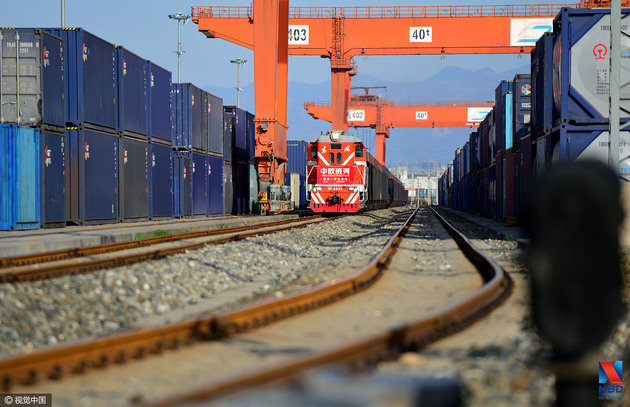
Photo/VCG
Three years after the first cargo train embarked on its adventure from Yiwu, China's most famous commodities center, to Madrid, nine routes to Europe have been established for the intercontinental rail freights, which have become a carrier of Sino-European trade and communication.
Linking Zhejiang's Yiwu, the world's largest wholesale market for small consumer goods, with the European commodity center of Madrid, the Yiwu-Madrid freight route was launched in 2014. It has seen 264 intercontinental trips so far, carrying 21,536 twenty-foot equivalent units. As of press time, the route has covered 8 countries, including Russia, Poland and France, boosting foreign trade in east China's export powerhouse of Zhejiang.
"The trade between China and Europe is booming. Under the framework of the Belt and Road Initiative, the Yiwu-Madrid route will conduct cooperation with more countries in the future, while the frequency of our freight trains will be increased accordingly," Fang Xudong, vice director of Yiwu Timex Industrial Investment Co., which is the only private operator of the Yiwu-Madrid freight route, told People's Daily Online.
Booming opportunities for Sino-EU Trade
"The Yiwu-Madrid freight route has eyed a boom in freight volume this year. At least two freight trains laden with various goods are sent to Madrid weekly. The number can reach to five due to the influence of the upcoming Christmas," Mao Yaokun, an official of the Yiwu Freight Station, told People's Daily Online.
The booming intercontinental transportation has led to strong economic growth in Yiwu. The city's total value of imports and exports has reached 48.88 billion yuan (7.41 billion U.S. dollars) in the first quarter of 2017, growing 23.72 percent year on year. Over 1.8 million kinds of commodities have been exported from Yiwu to 219 countries and regions in the world, according to Xinhua News Agency.
"When the freight route was first established, its main function was to bring Chinese small goods to the European market. After three years of development, many European companies have also used our freight service to promote their products in China, creating a win-win solution for both sides," said Zheng Xin, a custom officer of Yiwu freight station.
According to statistics from local authorities, import goods carried by the freight trains have become more diversified in recent years, from wine and edible oils to maternal and children supplies, as well as industrial equipments and components.
"I'm very interested in the freight train service, as it seems to be much cheaper than air transportation, and much safer and faster than sea transportation. It would be nice if the train can bring our agricultural goods to China, helping us to open the market," said Sergey Dolohov, a merchant from Ivanovo Oblast, Russia.
"As more countries have accepted the concept of China's Belt and Road Initiative, more foreign companies have considered using our service to bring their goods to China. We are planning to put more trains in use, as well as making connections with more countries," said Fang.
Fang noted that the transportation fee of the freight train has dropped 50 percent compared to three years ago, while the shipping time has been reduced from 21 hours to 16.
The freight train has also brought new opportunities to Sino-EU trade. According to Xinhua, eight overseas warehouses and five distribution stations were built along the Yiwu-Madrid freight route, while a commodity market is expected to be built in Madrid soon.
Email: lansuying@nbd.com.cn


 川公网安备 51019002001991号
川公网安备 51019002001991号





